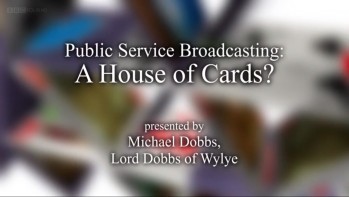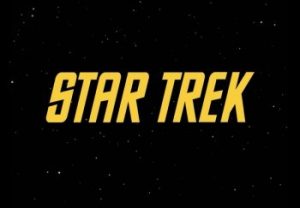
May 13th 2015 marks the ten year anniversary of the cancellation of Star Trek: Enterprise, a series that failed to live up to its own mandate, ‘to boldly go where no one has gone before.’ Barring The Original Series (TOS), which was cancelled after three seasons despite a now legendary letter-writing campaign, each successive series of Star Trek – from The Next Generation (TNG) to Deep Space Nine (DS9) and Voyager (VOY) – lasted seven seasons respectively. That Enterprise was axed after only four seasons is further tainted by the fact that this manoeuvre meant that Star Trek, in whatever iteration, was no more. Following eighteen consecutive years or twenty-five seasons and 624 episodes of television, Star Trek ended with a whimper, rather than a bang.
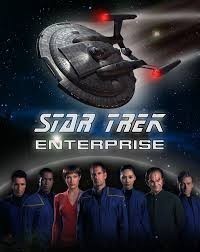
Four years later – a micro-second for Data, but a lifetime for avid Trekkers – and J.J Abrams’ resuited and rebooted Enterprise took to the stars once again and rejuvenated the franchise as an economically viable asset. Despite fan protestations about fidelity – ‘Trek in name only,’ as one fan put it — and the sequel, Star Trek Into Darkness being voted the worst in the entire franchise, both films were box office triumphs, if not generally critically acclaimed.

Next year, 2016, marks another, more positive occasion: the fiftieth anniversary of the Star Trek franchise. To celebrate this momentous occasion, a third instalment of the rebooted film series is due for release. But wouldn’t this anniversary be better celebrated with a return to television where Star Trek originated and arguably belongs? To be sure, this is not a new argument, but one which has been featured in news outlets both in print and, more notably, online.
In 2004, J. Michael Straczynski and Bruce Zabel pitched an idea to Paramount executives. In the document, the authors argue that the Trek franchise is in peril: ‘Ratings have declined, demographics have stagnated, and it seems as if every few weeks a new article asks: “what’s wrong with Star Trek? Or ‘Can Star Trek be saved? […] Are the wheels falling off the franchise?’
The document is remarkably prescient given the cancellation of Enterprise the following year, but even more astounding is that the authors proposed a reboot of the universe to ‘reset,’ ‘reimagine’ and ‘reinvigorate’ the ailing brand. ‘The best solution,’ they argue, ‘is to go back to the beginning and start again.’ The new series would start with a two-hour pilot that ‘tells the story no one has ever seen,’ that is, the inaugural meeting between the holy trinity of ‘the warrior, the doctor and the priest’: Kirk, Bones and Spock.
Recognising the potential for fan discord about pre-established continuity, the authors suggest that the reboot take place in an alternate universe, ‘an elegant solution’ borrowed from ‘the experience of the comic book community.’ The classic Trek timeline would exist in Universe-A, while the rebooted continuity would take place in Universe-B. This would construct a space for a new beginning: ‘a reboot means a fresh start. That means not just new stories, but looking at our continuity in new ways.’
This not only shares common principles with the direction taken by Paramount, steered by Abrams and team, but the similarities are so striking that one would be forgiven for charging the Abrams cohort with larceny. While I have no evidence to support this, the fanboy within wants to scream ‘PLAGIARISM!’ especially given my affective displeasure (read: hate) towards so-called ‘Nu Trek.’ Of course, my dual identity as a scholar — that is, a reasonable, logical fellow who surveys popular culture from an objective distance while stroking one’s chin (bearded, of course) and sporting elbow patches on my worn in and threaded tweed jacket – means that I should be more dispassionate, more erudite, cool, calm and collected.
But, alas, I cannot. I, for one, would love to have seen Straczynsky and Zabel’s proposed TV series for that is where Star Trek belongs. On television, week in and week out, six months of the year, voyaging through space and visiting ‘new life and new civilizations’! Boldly going, and all of that.
I wonder why Paramount seems keen on eking out Star Trek every three to four years? Of course, there is also a comic series from IDW that fills in the gaps between film chapters, but this is hardly enough Trek for Trekkers. In Star Trek and American Television, Pearson and Davies argue that the Abrams’ films have ‘boosted Star Trek’s cultural currency, added to the value of the brand and the franchise, and attracted new fans’ (2014: 1). This may be so, but two films in six years without a TV series running during the hiatus is arguably damaging the brand-life of the mega-text. Just what is it that is preventing them from committing to this? Are they afraid of being burned again after Enterprise, a show which continues to air in syndication and sell blu-rays (read: make money)?
Not that Stracynski and Zabel’s pitch is an isolated incident, either. Before Abrams was hired, Bryan Singer (Superman Returns, X-Men) and Robert Meyer Burnett (Free Enterprise) were set to pitch a 25-page treatment to Paramount. By recognising the necessity for an upheaval of sorts to ward off brand-death, Singer and Burnett’s Star Trek: Federation chronicled a dystopian future where Starfleet is in ruins. A new, deadly enemy, The Scourge, emerges which leads to the creation of a new Enterprise, the first for 300 years, to save what remains of the Federation and build anew. Unfortunately, the team abandoned the project once Abrams was hired to direct Star Trek.

William Shatner, too, had a proposal vetoed by Paramount as did Jonathan Frakes who played Commander Riker in TNG and also directed two Trek films, First Contact and Insurrection. Frakes’ series would have functioned as a sequel to TNG by following the adventures of Riker as the newly promoted Captain of the USS Titan.
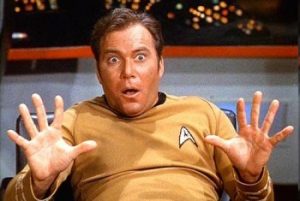
On multiple occasions, Bryan Fuller (Voyager, Pushing Daisies) has expressed an interest in reviving Star Trek on the small screen and mentioned in an interview that he would like to set it on the USS Reliant with Captain Angela Basset and First Office Rosario Dawson at the helm. (Now that I would love to see!)
Actor, Michael Dorn, has also been making some noise on the convention circuit about a new TV series which would focus on the character he played for over a decade in both TNG and DS9 as well as four feature films. Captain Worf has been proposed to Paramount although there is no news on an outcome either way.
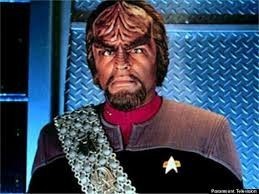
In 2014, The Huffington Post reported that CBS and Netflix were in talks to develop a new Star Trek series but nothing has come of this as yet although Larry Nemecek claims that Netflix has ‘made overtures. But nothing so far’.
More recently, President of the US broadcast channel, The CW, Mark Pedowitz, revealed that he would like to air a new Trek TV series on the network, but, once more, these appear to be nothing more than rumours and wishful thinking as yet.
In an online article, Trekker Todd VanDerWerff suggests that a Star Trek TV series should emulate the anthology format of American Horror Story or True Detective to focus on self-contained mini-series containing ten to thirteen episodes per season as opposed to the traditional standard of twenty to twenty-six instalments. In so doing, this would allow for greater freedom of storytelling and ward off potential franchise fatigue by changing tack each season. Imagine Ronald D. Moore committing to one, final season for TNG crew, or finding out what happened to Benjamin Sisko after the culmination of DS9? What about other crews, other starships, and other quadrants across the galaxy? We could have Captain Worf, Federation, and others, but, instead of outstaying their welcome, offer new perspectives each and every season. Rather than be shoehorned into a show that is bounded to one ship, one crew, one cast, wouldn’t this be worth pursuing? VanDerWerff suggests that Netflix would be the place to do this which brings me to my final point.
Did Enterprise fail because of franchise fatigue, a declining viewership or a general crisis in Trekdom? Perhaps Enterprise failed to adapt to the shifting demands of what has become known as ‘the post-broadcast era,’ as Inna Rae Hark argues (2008) (see also Pearson and Davies, 2014). Given the popularity of Netflix series, such as House of Cards and Orange is the New Black, and the rise of other streaming services committed to original programming (Amazon Studios, Yahoo! Screen), this could be the perfect place for a new Star Trek television series.
The next regeneration of Star Trek is on television: you know it makes sense.
*RIP Leonard Nimoy: ‘of all the souls I have encountered in my travels, his was the most…human.’

William Proctor is a lecturer in Media, Culture and Communication at Bournemouth University. He has published numerous articles on film and comic book reboots, The Walking Dead, Star Wars, Batman and James Bond. At present, William is writing a single authored monograph which expands his PhD thesis titled Regenerations: The Reboot Phenomenon in Comics, Film and TV which will be published by New York University Press in 2016. He is also director of the World Star Wars project which is a global ethnographic project to be conducted in 2017.





